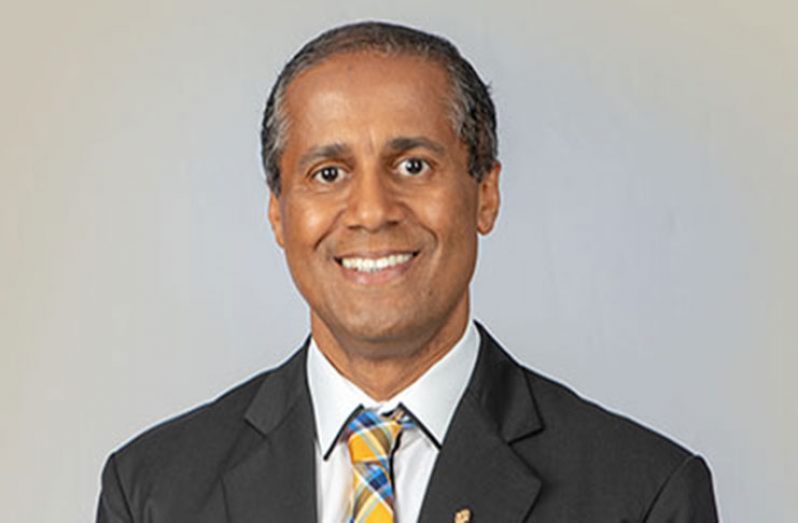DESPITE the prevailing economic slowdown caused by the Novel Coronavirus (COVID-19) pandemic, Republic Financial Holdings Limited (RHFL) – the parent company of Republic Bank Guyana Limited, has recorded a profit of US$81.7M for the first half of the financial year.
The company’s President, Nigel Baptiste said, in a press statement, the profit represents a decline of US$36.1M or 30.6 per cent, when compared to the corresponding period last year.
“These results reflect preliminary estimates of the financial impact of the novel coronavirus (COVID-19) pandemic on the group as a result of increased operating expenses during the latter half of March 2020 and the setting aside of additional provisions of US$55.3M for the first half of Fiscal 2020 (2019 – US$20.3M) to cover potential future losses,” said Baptiste.
He advised that total assets stood at US$14.8B at March 31, 2020, an increase of US$2.3B or 17.9 per cent over the total assets at March 31, 2019, reflecting mainly the acquisition of Scotiabank’s operations in St. Maarten and the Eastern Caribbean (except Antigua and Barbuda), on November 1, 2019, which added US$1.9B to the group’s asset base.
The acquisition of Scotiabank’s banking operations in the British Virgin Islands remains ongoing, with the group presently engaged with the regulator in that territory to obtain the requisite approval.
“Cognisant of our responsibility to help our clients, staff, and communities navigate these unique challenges, the group instituted several measures, including loan payment moratoriums, waiver of fees and charges, and interest rate reductions on loans and advances including credit cards.”
“The group has also contributed a total of US$2M to national COVID-19 initiatives across the territories in which we operate,” said Baptiste.
Stressing the importance of a prudent approach given the many uncertainties as a result of the current pandemic, Baptiste went on to say: “Notwithstanding the public health measures implemented to date, there is uncertainty globally in respect of the intensity and duration of this crisis, and it is unclear what the social, economic and market conditions will be like once the crisis is over.
“Prudence requires therefore, that financial institutions adopt a defensive posture to preserve the stability of individual institutions and the integrity of the overall financial system. Therefore, until the full repercussions are clearer, and to preserve the capital available to the group, the Board of Directors has declared a reduced interim dividend of US$0.09 (2019: US$0.19) per share payable on June 5, 2020.”
Despite the odds, he said the company is well-placed to make a major contribution to the regional recovery effort and is fully committed to doing so. The company will seek to balance the interests of all stakeholders, as they shoulder the responsibility of restoring sustainable growth to the territories in which the company operates.
In February, it was reported that the local banking industry continues to flourish and testimony to this is Republic Bank Guyana’s first-quarter profit of $1.1B.
Following up on its overall profit of $3.8B for 2019, the company recorded an after-tax profit of $1,117,000,000 for the first quarter of the financial year 2019/2020. This represented an increase of $161M or 16 per cent when compared to the corresponding period last year.
Added to the “significant improvement” in profits, the bank, in a notice, said its total assets grew by $20B or 11.6 per cent and customers’ deposits also grew by $14.8B or by 10 per cent year-on-year.
Recently, the Inter-American Development Bank (IDB) had said unless governments of Latin America and the Caribbean implement well-focused programmes to offset the impact of the COVID-19 pandemic, the region may see growth reductions of up to 5.5 per cent of GDP in 2020.
In a report titled ‘Policies to Fight the Pandemic: 2020 Latin America and the Caribbean Macroeconomic Report’, the IDB gave an overview of the macro-economic circumstances of the region and outlined a number of scenarios to demonstrate the possibilities for relief for economies in various stages of development as is the case in the region.
“Our region will suffer an economic shock of historic proportions,” said IDB Chief Economist, Eric Parrado, in an IDB press release accompanying the report. “Countries should be saving lives, by ensuring social distancing and providing their health sectors with adequate resources. Complementary and temporary economic interventions can support economies during the partial, organized shut-downs.”
“We need to preserve the core of our economies intact to improve the chances of a quick rebound,” Parrado added. “Providing relief to those more vulnerable households that have lost their sources of income, helping and giving incentives to firms to reduce liquidations and avoid separation from their employees, and extending liquidity to banks so they be part of the solution, can all work in that direction.”
The IDB said that the region’s first priority should be to “stop the spread of the virus, prevent the health sector from becoming overwhelmed, ensure it has adequate resources, and save lives”. It said a second focus should be to provide relief to those “more vulnerable households” that have lost their sources of income” as a result of social distancing and other measures. “And a third should be to support firms to minimise the rise in unemployment, to try to avoid the separation between firms and their employees and costly bankruptcies and liquidations,” the report said.
Quoting a study done by the Imperial College London, the IDB said that without policies to suppress the spread of the virus, there would be as many as 3.2 million deaths in Latin America and the Caribbean. However, the bank noted that countries are taking strong measures to suppress the spread of the virus.
Despite the gloomy projections, most international, financial institutions have projected an over 50 per cent growth in Guyana’s economy, for this year.


.jpg)











